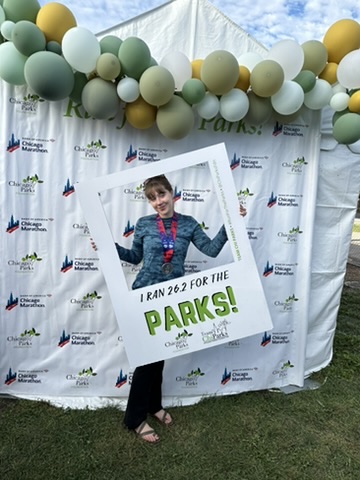
Fourth-year Anya Moseke and third-year Benjamin O’Donnell ran with over 53,000 others in the Bank of America Chicago Marathon on October 12. To qualify for the race, the two of them raised over $3,000 for the Chicago Parks Foundation (CPF).
Moseke and O’Donnell joined more than a million people who have crossed the finish line in the race’s 48-year history. Runners can register for the race through many different pathways, one of which is charity. To enter through charity, a racer must pick an approved organization and raise a certain amount of money depending on the charity.
Moseke and O’Donnell both fundraised for the Chicago Parks Foundation, which helps with park upkeep and development projects in the city.
“[The CPF] do[es] a lot of good work,” O’Donnell said. “If you ever run down by the lakeshore—the long path that could get you through green spaces all the way to the Riverwalk downtown—they do a lot of the upkeep and maintenance that makes that so beautiful and nice for everyone to enjoy.”
The race was O’Donnell and Moseke’s second and third marathon respectively, and they both trained over the summer by running progressively longer distances and more frequently. “I usually do eight-week training blocks,” Moseke said.
In addition to the basic training, Moseke and O’Donnell had race strategies they planned to employ. “I really like having gummies on me when I’m running—I kind of hate the energy gels,” O’Donnell said, adding that he prefers Scandinavian Swimmers from Trader Joe’s even though they get “gooey and squishy by the end of the race.”
The day was not without its challenges, O’Donnell explained. “It was exhilarating and painful at the same time,” he said. “I got pretty bad muscle cramps two-thirds [of the way] through the race.” For Moseke, “getting through miles 16 to 18 was hard.”
Chicago community members who came to support runners, though, made the race less difficult, O’Donnell added. “There’s a constant roar the whole way down the course [and] three-people-deep spectators along the entire race,” he said. “It’s like a chorus almost the whole way through.”
O’Donnell said his biggest takeaway from the marathon was that “you can do anything you really set your mind to…. I think everyone should at least try once in a life.”








